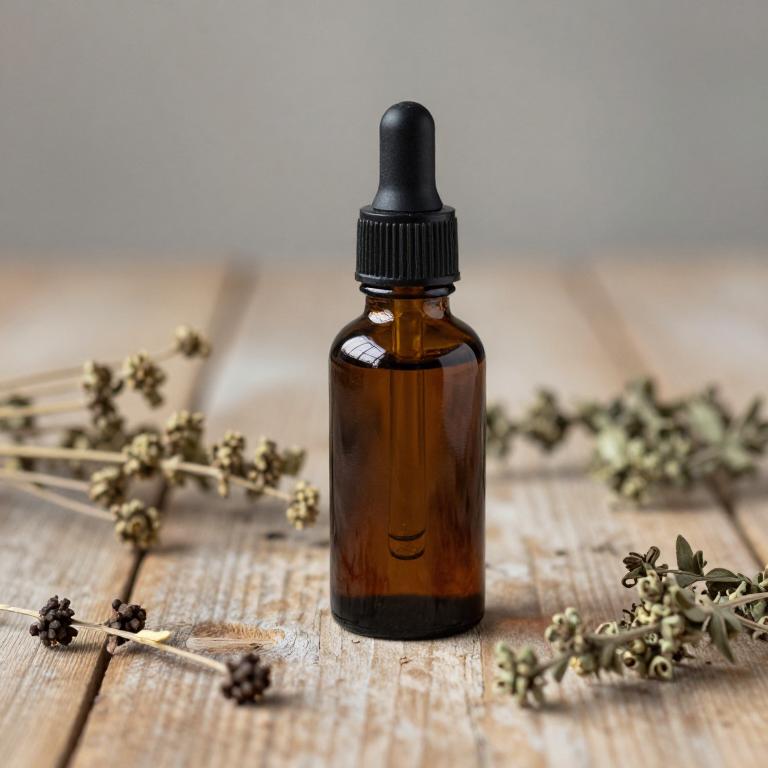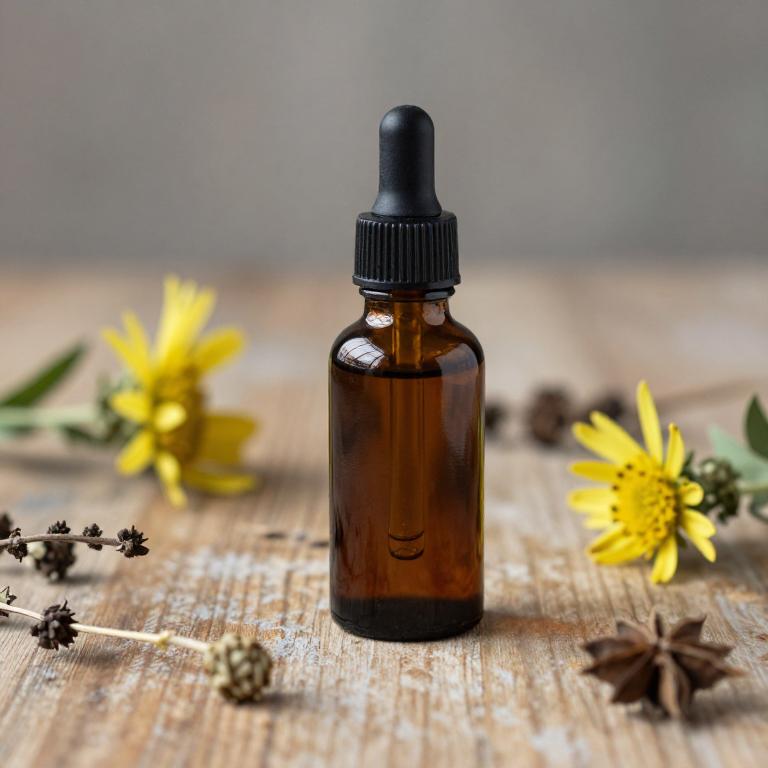10 Best Herbal Tinctures For Gum Swelling

Herbal tinctures have gained popularity as natural remedies for gum swelling due to their anti-inflammatory and antimicrobial properties.
Commonly used herbs such as echinacea, goldenseal, and myrrh are often incorporated into tinctures to help reduce inflammation and prevent infection. These tinctures can be applied directly to the gums or used as part of a mouth rinse to soothe irritation and promote healing. While they may offer relief, it is important to consult with a healthcare professional before using herbal tinctures, especially if symptoms persist or worsen.
Overall, herbal tinctures can be a complementary approach to managing gum swelling when used responsibly and in conjunction with proper dental care.
Table of Contents
- 1. Salvia (Salvia officinalis)
- 2. St. john's wort (Hypericum perforatum)
- 3. Stinging nettle (Urtica dioica)
- 4. Yarrow (Achillea millefolium)
- 5. Marigold (Calendula officinalis)
- 6. Oregano (Origanum vulgare)
- 7. Echinacea (Echinacea purpurea)
- 8. Dog rose (Rosa canina)
- 9. Purple coneflower (Echinacea angustifolia)
- 10. Peppermint (Mentha piperita)
1. Salvia (Salvia officinalis)

Salvia officinalis, commonly known as sage, has been traditionally used for its medicinal properties, including its potential benefits for oral health.
Herbal tinctures made from salvia officinalis may help reduce gum swelling due to their anti-inflammatory and antimicrobial properties. These tinctures can be applied directly to the gums or used as a mouth rinse to soothe irritation and promote healing. However, it is important to consult a healthcare professional before using sage tinctures, especially if you have existing oral conditions or are taking other medications.
While some studies suggest possible benefits, more research is needed to fully understand the efficacy and safety of salvia officinalis tinctures for gum swelling.
2. St. john's wort (Hypericum perforatum)

Hypericum perforatum, commonly known as St. John's Wort, is a traditional herbal remedy that has been used for centuries to address various health issues, including inflammation and pain.
While it is well-known for its antidepressant properties, hypericum perforatum tinctures may also offer benefits for gum swelling due to their anti-inflammatory and antimicrobial effects. The tinctures are typically prepared by soaking the dried plant material in alcohol, which helps extract its active compounds such as hypericin and flavonoids. When used as a mouth rinse or applied topically, these tinctures can help reduce gum inflammation and promote healing.
However, it is important to consult with a healthcare professional before using St. John's Wort, as it may interact with certain medications.
3. Stinging nettle (Urtica dioica)

Urtica dioica, commonly known as stinging nettle, has been traditionally used in herbal medicine for its anti-inflammatory and astringent properties.
When prepared as a tincture, it can be used to help reduce gum swelling and promote oral health by soothing inflamed tissues. The tincture is typically made by soaking fresh or dried nettle leaves in alcohol for several weeks, allowing the active compounds to infuse into the solution. For gum swelling, a diluted form of the tincture can be applied directly to the affected areas using a clean swab or rinsed in the mouth.
However, it is important to consult with a healthcare professional before using nettle tinctures, especially if you have allergies or are taking other medications.
4. Yarrow (Achillea millefolium)

Achillea millefolium, commonly known as yarrow, has been traditionally used in herbal medicine for its anti-inflammatory and astringent properties, making it a potential remedy for gum swelling.
When prepared as a tincture, achillea millefolium can be used topically or orally to reduce inflammation and soothe irritated gum tissues. The active compounds in yarrow, such as flavonoids and volatile oils, contribute to its ability to combat bacterial infection and promote healing. Herbal tinctures made from achillea millefolium are often diluted with alcohol or glycerin to ensure safe application, and they can be used as a complementary treatment alongside conventional dental care.
However, it is important to consult with a healthcare professional before using yarrow tinctures, especially for individuals with allergies or existing medical conditions.
5. Marigold (Calendula officinalis)

Calendula officinalis herbal tinctures are derived from the flowers of the calendula plant, known for their anti-inflammatory and antimicrobial properties.
These tinctures can be used topically to reduce gum swelling and irritation caused by periodontal issues or dental infections. The active compounds in calendula, such as flavonoids and triterpenes, help soothe inflamed tissues and promote healing. When applied directly to the gums, calendula tinctures may alleviate discomfort and support oral health.
However, it is advisable to consult with a healthcare professional before using calendula tinctures, especially if you have allergies or are taking other medications.
6. Oregano (Origanum vulgare)

Oreganum vulgare, commonly known as oregano, has been traditionally used in herbal medicine for its potent anti-inflammatory and antimicrobial properties.
When prepared as a tincture, oregano can be applied topically or ingested in small amounts to help reduce gum swelling and promote oral health. The active compounds, such as carvacrol and thymol, contribute to its ability to combat bacterial infections and soothe inflamed tissues. However, it is important to consult a healthcare professional before using oregano tinctures, especially for those with sensitive gums or existing medical conditions.
Proper dilution and usage guidelines are essential to ensure safe and effective application.
7. Echinacea (Echinacea purpurea)

Echinacea purpurea herbal tinctures are traditionally used to support immune function and may help reduce inflammation associated with gum swelling.
These tinctures contain compounds like alkamides, caffeic acid derivatives, and flavonoids, which have antimicrobial and anti-inflammatory properties. When applied topically or taken orally, echinacea can help soothe irritated gums and promote healing. However, it is important to consult with a healthcare professional before using echinacea, especially if you have existing health conditions or are taking other medications.
While some studies suggest potential benefits, more research is needed to fully understand its efficacy for gum-related issues.
8. Dog rose (Rosa canina)

Rosa canina, commonly known as rosehip, is a traditional herbal remedy that has been used for centuries to support overall health, including oral health.
Rosa canina herbal tinctures are made by extracting the fruit of the rose plant, which is rich in antioxidants, vitamins, and anti-inflammatory compounds. These tinctures may help reduce gum swelling by combating inflammation and promoting healing in the gums. The anti-inflammatory properties of rosehip can aid in alleviating symptoms associated with gingivitis and other gum-related conditions.
When used as part of a holistic oral care routine, Rosa canina tinctures may offer natural support for maintaining healthy gums and preventing dental issues.
9. Purple coneflower (Echinacea angustifolia)

Echinacea angustifolia herbal tinctures are commonly used for their anti-inflammatory and immune-boosting properties, which may help alleviate gum swelling caused by conditions like gingivitis.
The tincture contains active compounds such as alkamides, caffeic acid derivatives, and polysaccharides that reduce inflammation and support the body’s natural defenses. When applied topically or taken orally, echinacea may help reduce redness, swelling, and bacterial growth in the gums. However, it is important to consult a healthcare provider before use, especially for those with allergies or taking other medications.
While some studies suggest potential benefits, more research is needed to confirm its efficacy for gum-related issues.
10. Peppermint (Mentha piperita)

Mentha piperita, commonly known as peppermint, is often used in herbal tinctures to address gum swelling due to its anti-inflammatory and antimicrobial properties.
These tinctures work by reducing inflammation and soothing the irritated tissues in the mouth, which can help alleviate discomfort associated with gingivitis or periodontal issues. The cooling effect of peppermint also provides a refreshing sensation, making it a popular choice for natural oral care. When applied topically or used as a mouth rinse, peppermint tinctures can support gum health and promote healing.
However, it is advisable to consult a healthcare professional before using these tinctures, especially if you have existing oral conditions or are taking other medications.